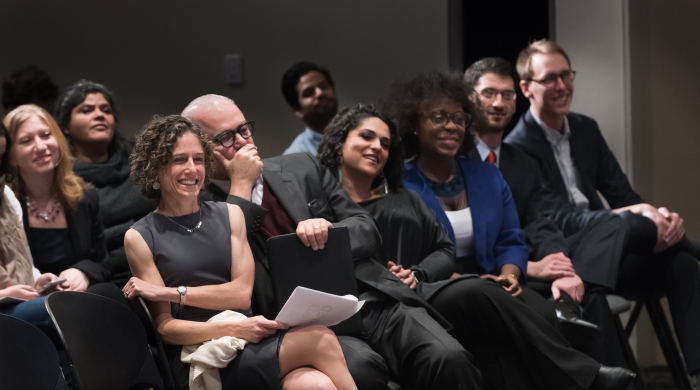
About the Child Mental Health Disparities Working Group
Children with or at risk for mental health difficulties experience considerable challenges in various areas of life and across multiple settings. Differential effects of policies and disparities in access to effective support systems and interventions for these children are notable in the most vulnerable populations. Improving outcomes for vulnerable children and their families through understanding and improving policy and interventions is the focus of this workgroup.
The Child Mental Health Disparities Working Group involves faculty across various disciplines partnering with key community settings to develop and evaluate novel approaches to addressing mental health disparities.
The Child Mental Health Disparities Working Group is supported by NYU’s Institute of Human Development and Social Change (IHDSC) and advances NYU’s mission to leverage rigorous scholarship toward social impact. If you are interested in the Child Mental Health Disparities Working Groups, please contact Dr. Anil Chacko at anil.chacko@nyu.edu
NYU Schools:
NYU Faculty Members
Rachel Abenavoli is a Research Assistant Professor of Applied Psychology at New York University’s Steinhardt School of Culture, Education, and Human Development. Her research intersects developmental, education, and prevention sciences and examines the contexts, programs, and practices that drive children’s social-emotional and behavioral development, particularly across the transition to school. An overarching goal of her work is to identify and strengthen approaches with potential for scale and sustained impact. Guided by this aim, Abenavoli focuses on school systems as powerful levers for change, teachers as central agents and targets of intervention, and research-practice partnerships as a promising way to generate relevant, rigorous, and actionable evidence. For the last four years, Abenavoli has been engaged in a partnership with the NYC Department of Education Division of Early Childhood Education to use data and research to strengthen implementation of the city’s universal pre-K initiative, Pre-K for All. Abenavoli was an Institute of Education Sciences (IES) Predoctoral Fellow and holds a Ph.D. in Human Development and Family Studies from Pennsylvania State University.
Mary Acri received both her MSW in social work and her PhD in clinical social work from New York University. She is currently a Research Associate Professor within the Department of Child and Adolescent Psychiatry at New York University School of Medicine. Her areas of professional interest include child disruptive behavior disorders; peer-delivered interventions, animal-assisted treatment for children with anxiety and autism, and developing and testing unique models of detection and outreach for families impacted by poverty.
R. Gabriela Barajas-Gonzalez is an Assistant Professor in the Department of Population Health at NYU Grossman School of Medicine. Her research centers on understanding the influence of social stressors on parental mental health, family functioning and child well-being, with a special focus on immigrant and Latinx families. In partnership with community-based organizations, she studies the impact of immigration enforcement threat on young children and on parent and educator well-being. She is also a co-investigator of a RCT of ParentCorps, a population-level family-centered, school-based intervention that aims to strengthen family engagement and attenuate the adverse effects of poverty on child development.
Elise Cappella is Director of NYU’s Institute of Human Development and Social Change and Associate Professor of Applied Psychology at NYU. Her scholarship examines and promotes mental health and academic achievement among students in school and out-of-school settings. In partnership with community and policy agencies, she studies school climate, teaching practices, peer relationships, and social-behavioral interventions that influence the learning and development of students experiencing risk due to poverty and/or behavioral problems.
Anil Chacko is a clinical psychologist whose research focuses on the development of engaging, effective, and sustainable prevention, intervention and service delivery models for youth at-risk for or affected with disruptive behavior disorders (e.g., attention-deficit/hyperactivity disorder; oppositional defiant disorder; conduct disorder), with a particular emphasis on supporting families from resource poor communities. He has a specific interest in considering how best to optimize these approaches within key child-serving settings (e.g., Head Start, Primary Care) with key workforces (physician, teachers, paraprofessionals).
Rachel Fish is Assistant Professor of Special Education in the Department of Teaching & Learning at NYU. She studies the social construction of disability and giftedness, and how these relate to inequality by race, gender, socioeconomic status, and linguistic background. Previously, she taught students with disabilities and giftedness in northwestern New Mexico. She received her Ph.D. in Sociology at the University of Wisconsin-Madison, and her M.A.T. in Special Education at Western New Mexico University-Gallup.
Pamela Morris-Perez is a Professor of Applied Psychology at the NYU Steinhardt School of Culture, Education, and Human Development. Morris-Perez’ research lies at the intersection of developmental psychology, suicidology, education, and policy and she has secured more than $75M in funding to support her research in her two-decades long career. Current work includes a $5M IES-funded partnership with NYCs Department of Education to support their historic expansion of Universal Pre-k, and a $5.5M NIH-funded trial of a tiered primary/secondary parenting intervention within the population-scalable pediatric care platform. Her newest research addresses adolescent suicide from a prevention, population-systems perspective. Complementing her research activity with institutional leadership, Morris-Perez oversaw 300 faculty in 11 Departments as Vice Dean and Interim Dean at NYU Steinhardt from 2015-2020, overseeing a rise in annual research expenditures from $27 to $39M under her leadership and the transition of 7,000 students to remote instruction during COVID-19. A former William T. Grant scholar, Morris-Perez served as lead editor of the Journal of Research on Educational Effectiveness and a member of the National Academy of Science’s Board on Children, Youth, and Families. She received a bachelor’s degree from Columbia University and a doctorate in Developmental Psychology from Cornell University.
Janet Njelesani is Assistant Professor of Occupational Therapy at NYU. As an occupational therapy practitioner and scholar, she conducts research that affirms the need for the protection rights of children with disabilities to be included in all global education initiatives. Her research investigates how social, cultural, and institutional practices intersect in influencing inclusion/exclusion, protection/violence, and education for children with disabilities. She employs critical social science theories to examine these macro-level phenomena and incorporate multiple disciplinary and methodological approaches from occupational therapy, education, and child protection to generate knowledge that has real-world impact.
Kristie Patten, PhD, OT/L, FAOTA, is Vice Dean of Academic Affairs at NYU Steinhardt and Associate Professor in the Department of Occupational Therapy. Dr. Patten’s research focuses on utilizing a strength-based paradigm, in partnership with stakeholders, to understand the impact of these issues on quality of life and well being with a focus on interventions in inclusive settings. Dr. Patten is the Principal Investigator of the NYU Steinhardt's ASD Nest Program, an inclusive program for children and adolescents with autism in the New York City Department of Education, the largest inclusion program in the country, grounded in strength based practices. She is Co-PI of an NSF grant entitled, “Developing Abilities and Knowledge for Careers in Design and Engineering for Students on the Autism Spectrum by Scaling Up Making Experiences” which is an expansion of an earlier NSF grant entitled "IDEAS: Inventing, Designing and Engineering on the Autism Spectrum". These projects leverage strengths and interests of 5th through 12th grade students on the spectrum to develop social competence and potential career pathways. Dr. Patten has published and presented nationally and internationally on topics related to examining the efficacy of public school interventions and viewing autism from a strength-based or abilities-based model.
External Faculty Members
Prerna Arora is an Assistant Professor of Psychology at Teachers College, Columbia University. Her primary research interests focus on issues of access and quality of care for historically underserved youth and adolescents. In particular, Dr. Arora’s research focuses on identifying risk and protective factors in the development of depressive disorders among ethnic minority and immigrant-origin youth; barriers to help-seeking among ethnic minority and immigrant-origin youth and families; and developing and implementing culturally-informed school and community-based prevention and intervention programming for youth internalizing disorders. Dr. Arora’s work is grounded in a participatory action research approach and incorporates the use of mixed methodology.
Geetha Gopalan is an Associate Professor at the Silberman School of Social Work at Hunter College, City University of New York. Her research focuses on increasing the ability of families impacted by poverty to access and engage in evidence-based practices which enhance children’s mental health and family functioning Her direct clinical practice experience, spanning over 10 years in children’s mental health and child welfare services, drives this scholarship towards a heavy emphasis on prioritizing the needs and interests of consumers (e.g., caregivers, youth) as well as designing and evaluating interventions which can easily engage families and be implemented in low-resource, “real-world” contexts.
Erum Nadeem is Associate Professor at the Graduate School of Applied and Professional Psychology at Rutgers University and Adjunct Associate Professor in the Department of Child and Adolescent Psychiatry at the NYU Grossman School of Medicine. Her work focuses on community-partnered research methods, implementation science to support the uptake of evidence-based practices in schools and community settings, and racial/ethnic disparities in children’s educational and mental health outcomes. She has particular expertise in supporting schools to respond to the needs of children and adolescents exposed to trauma.


